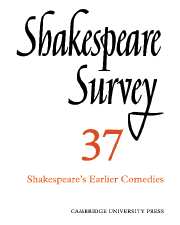Book contents
- Frontmatter
- Criticism of the Comedies up to The Merchant of Venice: 1953–82
- Plotting the Early Comedies: The Comedy of Errors, Love’s Labour’s Lost, The Two Gentlemen of Verona
- The Good Marriage of Katherine and Petruchio
- Shrewd and Kindly Farce
- Illustrations to A Midsummer Night’s Dream before 1920
- The Nature of Portia’s Victory: Turning to Men in The Merchant of Venice
- Nature’s Originals: Value in Shakespearian Pastoral
- 'Contrarieties agree': An Aspect of Dramatic Technique in Henry VI
- Falstaff’s Broken Voice
- ‘He who the sword of heaven will bear’: The Duke versus Angelo in Measure for Measure
- War and Sex in All’s Well That Ends Well
- Changing Places in Othello
- Prospero’s Lime Tree and the Pursuit of Vanitas
- Shakespearian Character Study to 1800
- How German is Shakespeare in Germany? Recent Trends in Criticism and Performance in West Germany
- Shakespeare Performances in Stratford upon–Avon–and London, 1982–3
- The Year's Contributions to Shakespearian Study 1 Critical Studies
- 2 Shakespeare’s Life, Times and Stage
- 3 Editions and Textual Studies
- Index
Shrewd and Kindly Farce
Published online by Cambridge University Press: 28 March 2007
- Frontmatter
- Criticism of the Comedies up to The Merchant of Venice: 1953–82
- Plotting the Early Comedies: The Comedy of Errors, Love’s Labour’s Lost, The Two Gentlemen of Verona
- The Good Marriage of Katherine and Petruchio
- Shrewd and Kindly Farce
- Illustrations to A Midsummer Night’s Dream before 1920
- The Nature of Portia’s Victory: Turning to Men in The Merchant of Venice
- Nature’s Originals: Value in Shakespearian Pastoral
- 'Contrarieties agree': An Aspect of Dramatic Technique in Henry VI
- Falstaff’s Broken Voice
- ‘He who the sword of heaven will bear’: The Duke versus Angelo in Measure for Measure
- War and Sex in All’s Well That Ends Well
- Changing Places in Othello
- Prospero’s Lime Tree and the Pursuit of Vanitas
- Shakespearian Character Study to 1800
- How German is Shakespeare in Germany? Recent Trends in Criticism and Performance in West Germany
- Shakespeare Performances in Stratford upon–Avon–and London, 1982–3
- The Year's Contributions to Shakespearian Study 1 Critical Studies
- 2 Shakespeare’s Life, Times and Stage
- 3 Editions and Textual Studies
- Index
Summary
If Shakespeare’s plays exemplify what humankind can achieve at its most vital, most thoughtful, and most sympathetic, not only a source of received wisdom but also a resource for those at odds with the received culture, The Taming of the Shrew remains an embarrassment to many who profess and call themselves Shakespearians. In our century a brisk revisionism has flourished. Two major series of scholiasts, the first generally modern and psychological, the second specifically feminist, have argued variously that the shrew never really was a shrew but a woman responding understandably to the abuse of a dreadful family, that she is not really tamed, and that her final speech on wifely obedience is a piece of extended irony that dupes perhaps Petruchio and certainly the other characters. Standing nearly alone in recent academic commentary, but supported by many theatrical productions, Robert Heilman has attempted to combat this taming of The Taming of the Shrew. Although he allows that Katherine and Petruchio are persons of wit and imagination rather than mere harridan and whip-wielder, Heilman insists that the play is a farce straightforwardly handling the matter named in its title, and dismisses revisionism as ‘a critical falconry that endeavors to domesticate [the play] within the confines of recent sensibility’. This dispute, which will surely continue, at present stands bracketed by two documents, comparison of which illuminates what it has and has not achieved.
- Type
- Chapter
- Information
- Shakespeare Survey , pp. 33 - 40Publisher: Cambridge University PressPrint publication year: 1984

